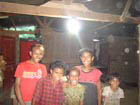Rural Electrification Plan

The financial amount necessary for the implementation of the Rural Electrification Plan has not, yet been totally unblocked, but the Secretariat of State for Energy Policy has already started the preparation work.
The population has been informed about the benefits of renewable resource exploration for the production of electrical energy for domestic consumption. The Government objective, for now, is to encourage the rural communities to generate their own production. In the medium term, consumption profitability is predicted, or, in other words, the population will be able to produce more energy than the one it needs so as to sell the excess production to the national electricity network.
In what concerns the energy supply to the more isolated communities, Avelino Coelho guarantees that the Government is aware of the current condition of the communities that live in the most remote areas, deprived of road access. Nowadays, around eight thousand families that live in these more remote areas already have the supply of energy guaranteed through the use of renewable energy resources, and around fifty thousand families still exist that weren’t covered by the distribution network.
“Even if the National electric Network is installed in those areas, it will be hard to supply those isolated communities. But we will do all we can so they can have access to electric energy” says the Secretary of State, reminding that it was exactly to overcome this difficulty that the Rural Energy Policy was defined.
For the execution of this plan, several action programs have already been introduced, such as biogas production, the micro hydro exploration, the micro wind power, solar panels and the gradual introduction of biofuel generators, which are more indicated for rural areas.
Timor-Leste is still dependable on the diesel Thermal Power Plants, however, in the rural areas the use of these renewable energies is being gradually implemented, which is benefiting the communities through the rural electrification plan, just as the Government Program predicts.
To begin the production of renewable type energies (biogas, micro hydro, micro wind, solar panels and biofuel generators) the community must make a request to the Secretariat of State of Energy Policy. “The request can be made by an association, by a NGO, by a group of women or by the local authorities”, explains the Secretary of State Avelino Coelho, adding that the important thing is whoever has the initiative of beginning the production must have the objective to serve the civil community that lives in the rural areas.
After analysing the project, a contract is established between the Secretariat of State for Energy Policy and the interested party, followed by the transference of the amount necessary for the future producers (preferentially, also, beneficiaries) who will manage the project. The Government will accompany and supervise the production, giving technical and financial assistance.










































